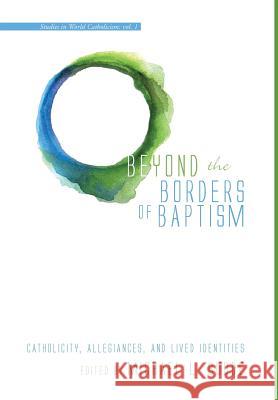Beyond the Borders of Baptism » książka
Beyond the Borders of Baptism
ISBN-13: 9781498204750 / Angielski / Twarda / 2016 / 366 str.
Beyond the Borders of Baptism
ISBN-13: 9781498204750 / Angielski / Twarda / 2016 / 366 str.
(netto: 249,09 VAT: 5%)
Najniższa cena z 30 dni: 260,82
ok. 16-18 dni roboczych.
Darmowa dostawa!
People worldwide find themselves part of overlapping communities of identity and belonging--racial, political, cultural, sexual, ideological. Some identities, like brand loyalties, are chosen; some, like class identity, are imposed. As followers of Jesus Christ, those called to live iln between the age that is and the age to come, Christians ask what it means to be part of the body of Christ, God's new creation from among the nations, in a world filled with other nations. ""Who--and whose--are we?"" There is no easy answer, no time at which Christians got it completely right. Yet such questions must be addressed, and the stakes are high. Matters of war and peace, exclusion and inclusion, who starves and who does not, the credibility of the gospel itself--all are caught up in the whirl of identities, allegiances imposed or refused, and questions about what ""the church"" might possibly mean in such circumstances. In this book, a distinguished group of scholars from five continents asks, ""How can the church respect the diversity of its members--many nations, cultures, and communities--while maintaining a coherent witness to the kingdom of God that is not undermined by more parochial ideologies or priorities?"" Chapter Contributors: Braden Anderson Maria Clara Lucchetti Bingemer Michael Budde Matthew Butler William Cavanaugh Jose Mario Francisco Peter Galadza Stanley Hauerwas Daniel Izuzquiza Slavica Jakelic Pantelis Kalaitzidis Eunice Karanja Kamaara Emmanuel Katongole Dorian Llywelyn Martin Menke Agbonkhianmeghe E. Orobator A. Alexander Stummvoll ""Theologians influenced by Stanley Hauerwas are often derisively asked, 'Where is this church of yours?' Budde's book shows that one answer is to look no further than the Catholic Church. As a Protestant theologian, I am often envious of a Church that perennially sits astride national and ethnic boundaries. And, as these eminent theologians make clear, the legacy of Catholicism's resistance to nationalism is not unmixed. It would be enough for this volume to showcase the important work of the Center for World Catholicism at DePaul. These ambitious essays go a good deal further. Their beauty will reshape your view of what the church is and could be."" --Jason Byassee, Butler Chair in Homiletics, Vancouver School of Theology ""In The Borders of Baptism, Michael Budde challenged US Catholics to take seriously the political and practical implications of our usually rote and casual claim--that Jesus is Lord--challenging Catholics to identify the idolatries that shape our lives and to understand the church as our primary location of identity and allegiance. In Beyond the Borders of Baptism, Budde is joined by a chorus of rigorous, theological analysts who explore, challenge, and complexify these claims from diverse global locations, rooting the question in historical contexts and bringing alive the textures of the constant negotiations between the body of Christ and the myriad political and cultural formations in which the church finds herself. This mosaic of analyses elucidates important theoretical questions, provides important examples of ecclesial failure, and converges toward an understanding of these border negotiations as eucharistic--kenotic, exploding tired binaries, and allowing the endlessly creative interruption of God's grace in histories to transform the reified loci we consider natural. Beyond the Borders of Baptism is a must-read for those interested in ecclesiology, Christian formation, and taking discipleship seriously."" --M. Therese Lysaught, Professor, Associate Director, Institute of Pastoral Studies, Neiswanger Institute for Bioethics, Stritch School of Medicine, Loyola University Chicago Michael L. Budde is Chair and Professor of Catholic Studies and Professor of Political Science at DePaul University, where he is also Senior Research Professor in the Center for World Catholicism and Intercultural Theology. He is the author of numerous books on ecclesiology,











